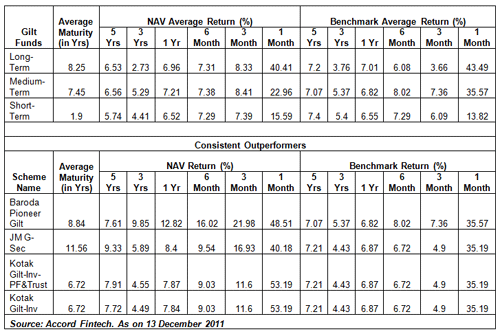Gilt funds predominantly invest in government securities (G-Sec) issued by the RBI on behalf of the government of India. This variant of debt fund invests only in government bonds unlike other debt funds which invest in debt instruments across the board. Since, G-Sec market is primarily dominated by institutional investors, gilt funds gives an opportunity for retail investors to participate in the bond market. Gilt funds are available for short-, medium- and long-term.
Risk involved in gilt funds
Though sovereign papers do not expose investors to credit risk, gilt funds does not guarantee returns like bank fixed deposits, saving accounts and small savings fund. The performance of these funds is affected by events like RBI monetary policy, supply/maturity of government debts, inflation & inflationary outlook, economic growth outlook, deposit/credit growth and global bond yields. Moreover, these funds invests in G-Secs which are not actively traded i.e. highly illiquid.
Who can invest?
Gilt funds are ideal for those clients of yours who are risk averse and at the same time expect to generate reasonable returns on their investment amount.
When should one invest?
An ideal time to invest in these funds is when interest rates are expected to peak, because there is an inverse relationship between the price of the G-Sec and interest rates. Bond yields and interest rates move in the same direction whereas the bond prices move in the opposite track. A fall in the interest rate leads to a rise in the bond prices as well as the NAV of the gilt fund or vice-versa. Also, longer the duration of the securities/portfolio higher will be the capital appreciation or vice-versa.
Current Scenario
Now that the benchmark yield have peaked out of 8.97% in November to below 8.50% levels in December 2011 following signs of easing inflation and hopes of a pause to the RBI rate hike, one can consider investing in gilt funds. However, given that we are expecting an economic slowdown, the performance of the funds in the near term would depend on the fund manager’s ability to aggressively manage duration and generate reasonable capital gains. The benchmark 10-Year government bond yield have surged to 7.5% in the year 2009, 7.9% in the year 2010 finally touching 8.97% in November 2011 following RBI measures to curb rising inflation. 
Precautionary factors that need to be kept in mind before recommending gilt funds
-
Lower expense ratio, exit load charges and period (shorter the better).
-
Fund size (large fund size could be a disadvantage at a time of extreme volatility).
-
Portfolio (quality and liquidity of the papers held).





